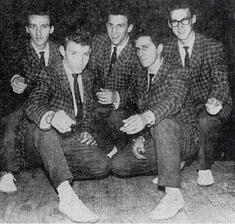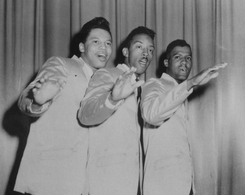-

The Danleers (Brooklyn, New York)
Personnel :
Jimmy Weston (Lead)
Johnny Lee (First Tenor)
Charles "Nat" McCune (Baritone)
Willie Ephriam (Second Tenor)
Roosevelt Mays (Bass)
Discography:
The Dandleers
1958 - One Summer Night / Wheelin' And A-dealin' (AMP 3 2115)
The Danleers
Singles :
1958 - One Summer Night / Wheelin' And A-dealin' (Mercury 71322)
1958 - I Really Love You / My Flaming Heart (Mercury 71356)
1958 - A Picture Of You / Prelude To Love (Mercury 71401)
1958 - I Can't Sleep / Your Love (Mercury 71441)
1960 - If You Don't Care / (I Live) Half A Block From An Angel (Epic 9367)
1960 - I'll Always Believe In You / Little Lover (Epic 9421)
1961 - Foolish / I'm Looking Around (Everest 19412)
1964 - If / Were You There (Smash-1872)
1964 - Where Is Love / The Angels Sent You (Smash-1895)
1964 - The Truth Hurts / Baby You've Got It (Le mans 005)
1965 - This Thing Called Love / I'm Sorry It Happened This Way (Le mans 008)
Unreleased :
1958 - Love, You Better Leave Me Alone (Mercury)
1958 - Just Look Around (Mercury)
1958 - You're Everything (Mercury)
1958 - Whole Mess Of Trouble (Mercury)
1958 - I Really Love You (Mercury)
1960 - I'll Be Forever Yours (Epic)
1960 - The Light Of Love (Epic)
Biography :
The Danleers were formed in Brooklyn, New York in early 1958 and consisted of Jimmy Weston-lead, Nat McCune-baritone, Roosevelt Mays-bass, and tenors Johnny Lee and Will Ephraim. As with countless groups before them, the young Brooklynites honed their sound on the streetcorners, playgrounds, and tenement hallways in the surrounding neighborhoods. Looking for both original material and someone with insiders knowledge of the recording industry, they found both in the person of one Danny Webb. He also provided the name of the group and so they became The Danleers. Within a short time they were in contact with a small New York based label called Amp-3 Records owned by Bill Lasley.
They soon recorded two songs written by Webb called "Wheelin' And Dealin' " and "One Summer Night".Soon Amp-3 #2115 hit the streets in May and with it the first timers had an instant classic. The demand for the tune on the radio and in record stores was so intense that Mercury Records the major label that had the distribution rights to Amp-3 picked up the ball and re-released the record on the Mercury label as #71322 in June. Now with the powerful name and distribution behind them The Danleers hit the big time. Mercury put the group at the head of all of its advertising that summer ahead of such pop music stalwarts as The Platters, Diamonds, and Patti Page. By August the group was as hot as an attraction could be and were a natural to be part of Alan Freed's Labor Day extravaganza at the Brooklyn Fox to give the boys a festive homecoming. The show would headline Chuck Berry, Bo Diddley, and the Everly Brothers.


Closely following the Freed show The Danleers are signed for a big national touring show, and the headliners were a who's who of the rock 'n roll scene in late 1958 : Frankie Avalon, Bobby Darin, Eddie Cochrane, Connie Francis, Dion & The Belmonts, Jimmy Clanton, Buddy Holly & The Crickets, Clyde McPhatter, The Coasters, Elegants, and Imperials. "One Summer Night" had made it into the top five national pop music best sellers and went over the million mark in sales, quite a heady achievement for an R & B vocal group in 1958 ! About this time the second recording by The Danleers is released on Mercury #71356 - "I Really Love You" and "My Flaming Heart", again both written by Danny Webb.

Louis Williams, Frankie Clemons, Jimmie Weston, Terry WilsonThis time the spell was broken as the record failed to garner much support among record buyers or radio djs. By year's end another Mercury recording of "A Picture Of You" and "Prelude To Love" was a no show on the charts and was ignored by the public. One last try for Mercury came in mid March of 1959 with "Your Love" and "I Can't Sleep" on #71441 and the failure cycle remained. As expected Mercury dropped the group as the popularity of the vocal group sound started on its long descent in the face of the teen idols.

Louis Williams, Terry Wilson, Jimmie Weston, Gaen EbronAfter the Mercury group broke up, Webb put Jimmy Weston together with three members of his other group, the Webtones, to form a new Danleers group: first tenor Louis Williams, baritone Terry Wilson, and bass Frankie Clemons. The fifth member was second tenor Doug Ebron, Jimmy Weston's brother-in-law and brother of another of the Webtones, Duke Ebron. (The fifth member of the Webtones had been Bruce Cooke.) They recorded a couple of forgettable items for Epic records - "If You Don't Care" and "Half A Block From An Angel" on #9367 and "I'll Always Believe In You" / "Little Lover" on #9421. For all intents and purposes, that was the end of The Danleers. There were two releases for Smash in the mid 60s with a completely revamped lineup, but they really had no connection to the original group.

Louis Williams, Jimmie Weston, Terry Wilson, Frankie ClemonsDespite the short and mostly unsuccessful history of the group, they did manage to become the epitome of the "one hit wonders" with the eternally popular tune "One Summer Night". It remains a timeless classic standard of the music and will be played as long as there is an audience for the musical history of America. And that is one celebrated accomplishment-one that should be cherished for all time.
...
 your comment
your comment
-
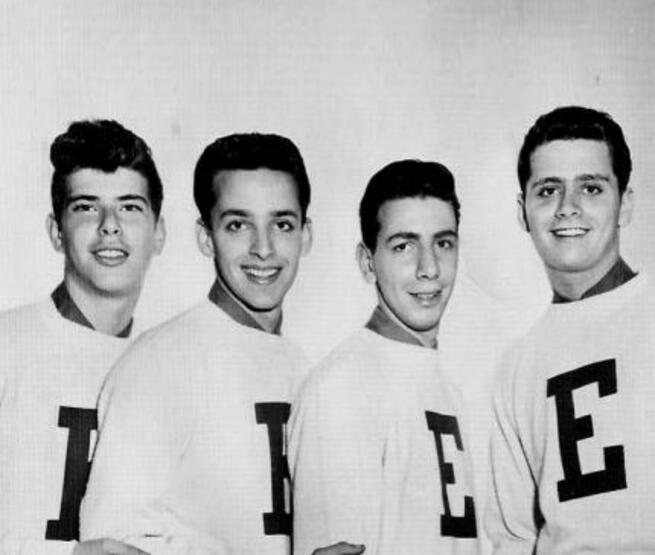
The El Tones (1) (Brooklyn, New York)
aka The EltonesPersonnel :
Stuart Elliot (Lead)
Allan Schein
Paul Schrager
Harvey Hertz
Discography :
The Eltones
Unreleased:
1958 - Do It By Moonlight
1958 - Honest I DoThe El Tones (1)
Singles:
1958 - Like Mattie / Lovin' With A Beat (Cub 9011)Biography :
The Eltones were formed on the corner of Elton Street and Dumont Avenue in Brooklyn in 1957. "Lovin' With A Beat" The lead in this song was Stuart, Stuart was also lead in "Like Matti", singing those high notes. This song was written by Sylvester Bradford for Gene Vincent as a Rockabilly song. Gene never used it so the Eltones recorded it.
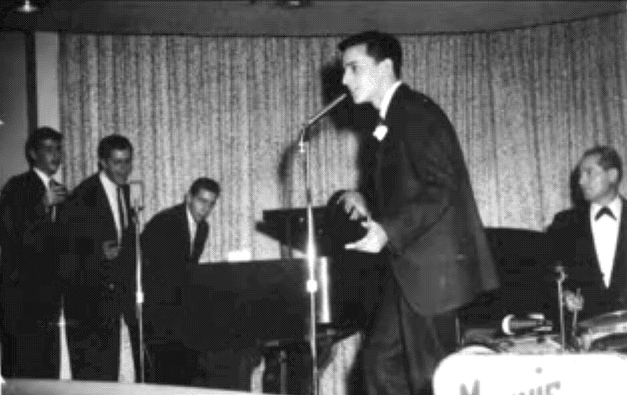
"Do It By Moonlight" was actually recorded as a demo in 1957 with " Honest I Do". Left in a demo studio for many years. Purchased for fifteen dollars shortly before it was to be destroyed. The studio was going to destroy the remaining copies but group member Paul bought it. Paul Schrager is the one pictured singing lead, think that's Harvey playing the piano in the background. Also "Moonlight" was the only song Paul sang as the lead.
Songs :
Honest I Do Do It By Moonlight
Lovin' With A Beat Like Mattie
... your comment
your comment
-

The Wigs - From left: Leroy McQueen, James Porter, Art Blakey and Albert BanksThe Wigs (Cleveland, Ohio)
ref : Billy Wells & The Crescents (2)
Personnel :Arthur Blackley (Lead / First & Second Tenor)
Albert Banks (Lead / First & Second Tenor)
Leroy McQueen (Baritone / Second Tenor)
James Porter (Bass / Baritone)
Discography :
1964 - Sweeter Than Wine / Chicken Switch (Golden Crest 592)Biography :
After one record for Reserve Records as Billy Wells & The Crescents in 1956, Lawyer "Henry" Curtis (tenor) replaced Billy Wells "William Burrell" and they continued to dazzle audiences. This version of the group do the background vocals for Clark Vaden's 45 release, "Irene," and "You Can Make It If You Try," on Dolly Records as the Crescents. Other members left for various reasons which left an opening for Arthur Blakey to join in 1963. Arthur Blakey did most of the Crescents' leads in his readily identifiable, boisterous, shouting, country preacher style. Other artists were amazed that the Crescents could do with four voices what some groups had difficulty achieving with five.
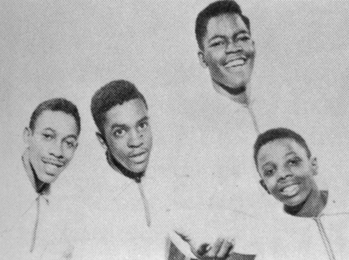

They approached Sid Friedman, their previous manager and booking agent, who after hearing their exciting sound, signed them to contracts and proceeded to launch them in a new direction. The motive was to cash in on the Beatles, the latest rage, who were coming to America. To be different, they decided to jettison the Crescents and renamed themselves the Wigs, after the Whig Political Party. Sid had colonial costumes made for them, complete with every detail from head to toe. The costumes were topped off with authentic-looking wigs. The group was a sight to behold. Friedman called Carl Maduri (who later hit with Wild Cherry), and he struck a deal for them with Golden Crest Records, where they enjoyed a second release, "Sweeter Than Wine," and then "Chicken Switch," as the Wigs, in 1964. As the Crescents, and the Wigs, the guys hung around approximately ten years, from 1956 to 1966.
Songs :
Sweeter Than Wine Chicken Switch...
 your comment
your comment
-

The Four Lovers (New-York)
Personnel :
Frankie Valli (Lead)
Hank Majewski (Bass)
Tommy DeVito (Tenor)
Nicky DeVito (Tenor)
Discography :
The Four Lovers
1956 - You're the Apple of My Eye / The Girl in My Dreams (RCA 6518)
1956 - Honey Love / Please Don't Leave Me (RCA 6519)
1956 - Jambalaya (On the Bayou) / Be Lovey Dovey (RCA 6646)
1957 - Never Never / Happy Am I (RCA 6768)
1957 - Shake a Hand / The Stranger (RCA 6812)
1957 - The Stranger / Night Train (RCA 6819)
1957 - My Life for You / Pucker Up (Epic 9255)
1957 - I Want a Girl (Just Like the Girl That Married Dear Old Dad) (RCA LP 1317)
1957 - Such a Night (RCA LP 1317)
1957 - (I Love You) For Sentimental Reasons(RCA LP 1317)
1957 - Joyride (RCA LP 1317)
1957 - This Is My Story (RCA LP 1317)
1957 - Memories of You (RCA LP 1317)
1957 - It's Too Soon to Know (RCA LP 1317)
1957 - San Antonio Rose (RCA LP 1317)
1957 - White Christmas (RCA LP 1317)
1957 - Cimarron (RCA LP 1317)
1957 - Lawdy Miss Clawdy (RCA LP 1317)
1959 - It May be Wrong / Please take a chance (Decca 30994)Frankie Valle & The Romans (2)
1959 - Come Si Bella / Real (This Is Real) (Cindy 3012)Biography :
The Four Seasons are justifiably among the most fondly remembered pop/rock vocal groups of the early to mid-'60s. Their soaring harmonies, coupled with Frankie Valli's exquisite falsetto lead on romantic, teenage-oriented songs, were as central to the early-'60s music scene as the work of the Beach Boys, Del Shannon, or any other top rock & roll names one cares to invoke from that period. But before Valli and company emerged with their first hit in the summer of 1962, they spent eight years working in music, first as the Variatones and, more permanently, as the Four Lovers. They never charted a record higher than number 62 (their only chart entry), but did record more than two dozen songs, including a complete LP for a major label. And their music roots were closer to Frank Sinatra than to Elvis Presley.

The Four Lovers started out in the early '50s, but the individual members' musical backgrounds went back to the 1930s. Their whole story started with the DeVito family of Belleville, a working-class town in northern New Jersey just outside of Newark, part of the same locale that produced Frank Sinatra, Connie Francis, and Lou Costello, among other performing legends during the 1930s. The whole family was musical and, beginning with eldest son Danny, took up singing and an instrument from their father. Tommy DeVito (born June 19, 1928) emerged in music at the age of ten, appearing on Major Bowes' Original Amateur Hour.
Two years later, he was singing and playing guitar with Nickie & the Starliters, an octet modeled after the professional pop (or "sweet," as they were called) bands of the era, led by his older brother Nickie DeVito (born September 12, 1924), who also played bass. They made a decent part-time living, picking up extra cash playing dances, weddings, and parties until World War II and the draft broke up their membership. After World War II, the two DeVito brothers tried keeping their hands in music and hooked up with Nick Macioci (born September 19, 1927, and better-known in later years as Nick Massi) to form what became the Variety Trio. They played local clubs, all of them singing, with Tommy and Nickie DeVito on lead and rhythm guitar, respectively, and Massi playing the upright bass. After a couple of years of successful local gigs, they added a fourth, part-time member who began showing up at their performances, Frank Castelluccio (born May 3, 1934, and later known as Frankie Valli). He was 16, had a distinctive voice, and a repertory of two songs, "I Can't Give You Anything but Love" and "My Mother's Eyes."

The sight of the slightly built teenager with the falsetto voice doing those pre-war songs was a novelty in itself, and they went over well with the group's audience. The trio split up in 1952, and for a time during the next couple of years, Castelluccio and Tommy DeVito worked together in various backing bands and recorded a pair of songs together under the auspices of Corona Records in New York. They formed a new group, the Variatones, with Hank Majewski on rhythm guitar and Billy Thompson on drums, while "Frankie Valley," as he was calling himself by then, handled the bass. In early 1956, they got an audition for RCA Victor, where they impressed the executives present with their harmony singing and their mixed repertory of country music and R&B.
This wasn't an uncommon mix at the time, nor was it unheard of for white vocal groups who were the least bit adventurous. A few white outfits, such as the Crew-Cuts, became notorious in purist circles for making more commercially successful covers of R&B singles by black groups, but many did take up the music with only the most honest and honorable intentions -- because they liked it -- and one outfit from Texas, the Mints, was regarded at the time as a serious white equivalent to the Treniers. The Variatones liked the music and had the talent and years of experience, together and collectively.


The group got a contract and a new name, the Four Lovers, and began a year-long stay with the record label. Thompson was soon gone from the lineup, with Valley moved over to drums and Nickie DeVito back in the fold on bass. They made their recording debut with a decided R&B emphasis, including a pair of Otis Blackwell songs, "You're the Apple of My Eye" and "Diddilly Diddilly Babe," "Honey Love" from the Drifters, a cover of Faye Adams' "Shake a Hand," and "Please Don't Leave Me," written by Fats Domino.
There were rocking sides there, though not even necessarily the kind of harmony based music that could be described as doo wop. Their version of "Shake a Hand" was as much a showcase for Tommy DeVito's hot guitar playing as it was for the group's backup singing, and the lead vocal is closer to Elvis Presley than to the falsetto singing that Valli would succeed with fronting the group six years later. Blackwell's "You're the Apple of My Eye," which had such a mannered and exaggerated performance that it almost sounded like a parody of R&B harmony material, ended up as the Four Lovers' one and only chart entry, peaking at number 62. The group kept trying and RCA kept trying with them, releasing another single and then an entire LP, entitled Joyride.


The latter is interesting to hear, both as a cultural artifact for the variety of vocal material (which includes a rocked up version of Irving Berlin's "White Christmas" and a cover of Lloyd Price's "Lawdy Miss Clawdy," and also pop numbers, a concession to the fact that early rock & roll listeners didn't buy many LPs) and as a document of the group's range, stuck in among the vocal numbers is the title track, an instrumental which was a surprise coming from a group known for its singing. By that time, rock & roll was sweeping the charts and the group's act was appropriately oriented toward harmony versions of R&B material. It wasn't enough to sell them to the public and in early 1957, they were dropped by RCA Victor.

The group stayed together, continuing to cut songs for Epic and OKeh, and by 1958, their lineup had changed with Nickie DeVito and Hank Majewski leaving to be replaced by Nick Massi and Hugh Garrity, both of whom drifted in and out of the group. In late 1959, they added Bob Gaudio, an ex-member of the Royal Teens who was a natural songwriter. That same year, they made their first contact with Bob Crewe, a producer who was always looking for local talent in the New Jersey/Pennsylvania area that he might record.

The Four Lovers came to an end as a name but not a group during the next few years. They did a lot of backup singing on behalf of other artists in sessions run by Crewe, and occasionally cut records of their own for local labels under various names until they finally settled on the Four Seasons in 1961. Their lineup, by then, was Frankie Valli, Bob Gaudio, Tommy DeVito, and Nick Massi. The group wasn't working nearly full-time or making much money, however, and by 1962, Valli was making his living in construction. It was in the spring of that year that Bob Gaudio came up with a song called "Sherry," that he insisted by given to Valli and their group to cut. Crewe agreed and released by the Vee-Jay label, it hit number one nationally barely a month after release, thus beginning a new, more visible and successful phase in the history of the Four Seasons.
Bruce Eder, All Music Guide
Videos :
You`re The Apple Of My Eyes
Baby Please Don`t Go
Songs :
The Girl In My Dreams Memories of you
Honey Love JambalayaCD:
 your comment
your comment
-

The Swallows (Baltimore)
Personnel :
Eddie Rich(Lead)
Earl Hurley(Tenor)
Herman 'Junior' Denby(Lead/Baritone)
Frederick 'Money Guiter' Johnson(Baritone/Guitar)
Norris 'Bunky' Mack(Bass)
Irving Turner (Tenor/Baritone)
Discography :
1951 - Will you be mine / Dearest(King 4458)
1951 - Wishing for you / Since you've been away(King 4466)
1951 - Eternally / It ain't the meet(King 4501)
1952 - Deed i do (King) (Unreleased)
1952 - Tell me why / Roll, roll, pretty baby(King 4515)
1952 - Beside you / You left me(King 4525)
1952 - I only have eyes for you / You walked in(King 4533)
1952 - Please, baby, please / Where do I go from here(King 4579)
1952 - Oh promise me (King) (Unreleased)
1953 - Laugh / Our love is dying(King 4612)
1953 - Bicycle tillie' / Nobody's loving me(King 4632)
1953 - Pleading blues / Trust me(King 4653)
1953 - It feel so good / I'll be wating(King 4676)
1954 - My Baby / Good time girls (After Hours 104/Chariot 104)
1954 - Walking by the river (After Hours) (Unreleased)
1956 - Come back to me (Decca 29828)
1958 - Angel baby / Oh lonesome me (Federal 12319)
1958 - Rock a bye baby rock / We mant to rock (Federal 12328)
1958 - Beside you / Laughing boy (Federal 12329)
1958 - Itchy twiychy feeling / Who knows, do you? (Federal 12333)
1958 - In The Palm Of My Hand (Federal) (Unreleased)
Biography :
The Swallows were, like their neighborhood influences The Vibranaires, from Baltimore, Maryland, and began their vocal harmonies soon after the end of World War II. They originally called themselves The Oakateers, but by 1949 were called The Swallows. The chosen name was as the story goes, in deference to their mentors who now called themselves The Orioles. After a number of local gigs in the Baltimore area, they came to the attention of King Records of Cincinnati and soon a recording session was arranged for the young singers. The group consisted of Eddie Rich, Fred Johnson, Junior Denby, Norris Mack, and Earl Hurley.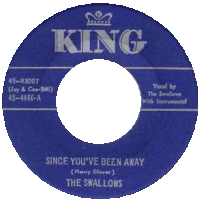

The first recording for the label was released in the spring of 1951 on King #4458. It paired "Will You Still Be Mine" and "Dearest". By July the record was a big seller in the bay area of San Francisco and Oakland. The popularity of the new group led to their first tour in which they were on the bill with the Count Basie Orchestra and vocalist Earl Williams, and hit a number of one nighters in the Eastern half of the country.About this time King #4466 was out pairing "Since You've Been Away" and "Wishing For You". By the end of the year the third release on King hit the streets - #4051 which paired "Eternally" and the ribald jump tune "It Ain't The Meat (It's The Motion)". The jump side was a big seller in the South especially in Georgia and the Carolinas.
In March of 1952 The Swallows played an early fifties dream bill on stage at the Earle Theater in Philadelphia with Johnny Ray (imagine the scene for that twosome !). The following month the group is well received at the Howard Theater in Washington D.C. on a show with the Sonny Thompson Combo and vocalist Lula Reed. King #4515 "Tell Me Why" / "Roll Pretty Baby" was released shortly after New Year's day and somehow got lost in the shuffle. The next King record which came out in April was #4525 was "You Left Me" and "Beside You" with Junior Denby taking over lead singing chores from Rich. Soon after the release of their new record, The Swallows play for two weeks in Atlantic City, New Jersey and get ready for their first extensive tour of the South.
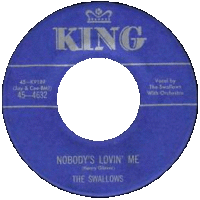

In May King releases the group's take on the fine pop standard "I Only Have Eyes For You" which predates the Flamingos version by six years (as an added bit of circumstance, The Flamingos were originally known as The Swallows until they discovered the King group had first dibs on the name !). The flip side on this record was "You Walked In". In August of 1952 The Swallows do a number of shows with Cleveland dj Alan "Moondog" Freed, along with Edna McGriff and the Buddy Lucas band.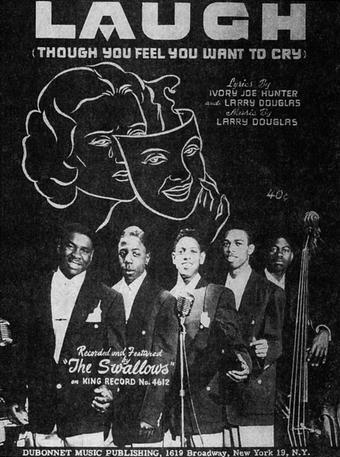
The shows do huge business in Lorraine, Akron, and Youngstown with SRO crowds. In mid September the group prepares for a seven week tour of the South where they remain popular. The touring show also features Wini Brown, H-Bomb Ferguson, Lil' Miss Sharecropper (LaVern Baker) and the Todd Rhodes Orchestra. While on this tour King puts out #4579 - "Where Do I Go From Here" and "Please Baby Please". The Swallows close a very successful year on the West Coast doing shows with R & B showstopper Amos Milburn.
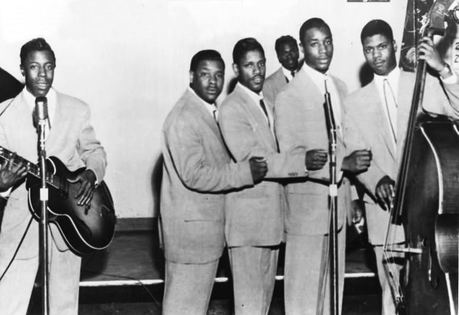
In early 1953 King #4612 is released - "Our Love Is Dying" / "Laugh". While traveling between appearances in Pennsylvania in February, the group is involved in an auto accident near Lancaster. They are fine physically but while waiting for needed auto repairs the group makes news locally by giving an impromptu concert at a nearby convalescent home. That spring King releases the mystically named "Bicycle Tillie" and "Nobody's Loving Me". "Pleading Blues" and the fine ballad "Trust Me" is next on King #4656 in late summer, and by the end of the year, the end is in sight for the group on King Records. The last release for the label is #4676 - "I'll Be Waiting" and "It Feels So Good".
By the end of 1953 the Swallows in their original form disbanded after five years together and two years of recording for King.
A revamped group gets together with remaining members Earl Hurley and Eddie Rich, original late 40s member Irv Turner, along with Al France and Ernie Bailey. By the spring of 1954 this new group of Swallows recorded one record for Lexy "Flap" Hanford's After Hours label : #104 - "My Baby" and "Good Time Girls" which sold fairly well in the group's home town of Baltimore and in Washington, D.C. After that one release for After Hours the group disbanded for good. But - not quite.

Four years later in the rock & roll teen idol phase, here comes The Swallows again. This time it is a group that evolved from a casual get together with original members Eddie Rich and Earl Hurley and singers Calvin Collette and Buddy Bailey (not the Clovers' Bailey) and back they were with Syd Nathan's R & B empire in Cincinnati, but this time on the Federal label. Four sides were issued in 1958 by this newly reconstituted version of the group. Federal #12319 - "Angel Baby" and "Oh Lonesome Me" both obvious covers, #12328 - "We Want To Rock" and "Rock-A-Bye-Baby Rock" trying to appeal to the late 50s teens, #123229 - "Laughing Boy" / "Beside You", and #12333 - "Who Knows, Do You?" and a cover of Bobby Hendricks "Itchy Twitchy Feeling" a straight rock & roll number. This last tune actually just barely touched the national pop charts in late 1958. Mercifully (in a way) this slight success did not breed a host of warmed over covers by the group.
Soon after, the Swallows were history leaving a legacy of more than a decade of music making and two years of super stylings by an inventive and dynamic vocal group that once again, had peaked too soon and thus was missed by the majority of listeners that came to know and appreciate the Rhythm & Blues performers of the early and mid fifties. But collectors know and treasure the King sides as a part of the history of this glorious music.
http://home.earthlink.net/~jaymar41/swallows.html
http://home.att.net/~freebizak/Swallows/swallows.htmlSong :
Eternally Since you've been away
Roll, roll, pretty baby Who Knows, Do You
It ain't the meet Beside you
CD :
MP3 :
 1 comment
1 comment
Doo Wop - Rhythm & Blues - Mail : jcpiazza26@gmail.com


